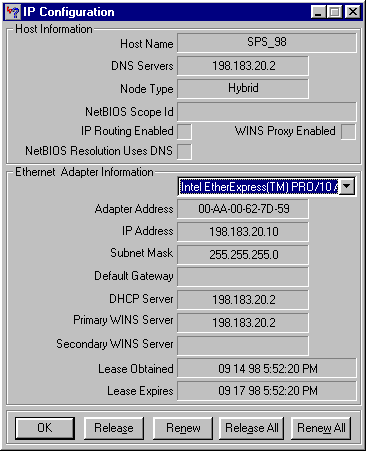|
|
|
Command Line Utilities
Arp- Arp.exe is used to resolve an IP address to its hardware (MAC address). Local Arp cache is checked first before initiating an ARP request broadcast
Switches
-a - View the
contents of the local ARP cache table
-s - Add a static Arp entry for
frequent accessed hosts
-d - Delete a entry
ipconfig - The ipconfig is a command line tool for NT that shows how the computer's IP stack is configured.
C:\ipconfig Windows NT IP Configuration: Ethernet adapter E100B1: IP Address ...................:198.133.234.23 Subnet Mask ..................:255.255.255.0 Default Gateway...............:198.133.234.2
Switches
/all - Extra
information is revealed; IP host name, DNS, WINS server
/release - If DHCP is
enabled, you release the lease with this switch.
/renew - The renew switch
will update and renew DHCP lease information from the DHCP
Server.
netstat The netstat tool displays protocol statistics and the state of current TCP/IP connections
C:\WINDOWS>netstat /?
Displays protocol statistics and current TCP/IP network connections.
NETSTAT [-a] [-e] [-n] [-s] [-p proto] [-r] [interval]
-a Displays all connections and listening ports.
-e Displays Ethernet statistics. This may be combined with the -s
option.
-n Displays addresses and port numbers in numerical form.
-p proto Shows connections for the protocol specified by proto; proto
may be TCP or UDP. If used with the -s option to display
per-protocol statistics, proto may be TCP, UDP, or IP.
-r Displays the routing table.
-s Displays per-protocol statistics. By default, statistics are
shown for TCP, UDP and IP; the -p option may be used to specify
a subset of the default.
interval Redisplays selected statistics, pausing interval seconds
between each display. Press CTRL+C to stop redisplaying
statistics. If omitted, netstat will print the current
configuration information once.
nbtstat The nbtstat checks the state of NetBIOS over TCP/IP connections and returns NetBIOS session and name resolution statistics. This tool can also be used to update the local NetBIOS name cache.
Displays protocol statistics and current TCP/IP connections using NBT(NetBIOS over TCP/IP).
NBTSTAT [-a RemoteName] [-A IP address] [-c] [-n]
[-r] [-R] [-s] [S] [interval] ]
-a (adapter status) Lists the remote machine's name table given its name
-A (Adapter status) Lists the remote machine's name table given its
IP address.
-c (cache) Lists the remote name cache including the IP addresses
-n (names) Lists local NetBIOS names.
-r (resolved) Lists names resolved by broadcast and via WINS
-R (Reload) Purges and reloads the remote cache name table
-S (Sessions) Lists sessions table with the destination IP addresses
-s (sessions) Lists sessions table converting destination IP
addresses to host names via the hosts file.
RemoteName Remote host machine name.
IP address Dotted decimal representation of the IP address.
interval Redisplays selected statistics, pausing interval seconds
between each display. Press Ctrl+C to stop redisplaying
statistics.
Note: Netstat works for TCP/IP connections, and Nbtstat works for NetBIOS connections.
nslookup The Nslookup tool is used to trace DNS queries from start to finish
Ping- Ping.exe verifies configurations and tests connectivity
![]()
If you can ping a
hostname but cannot connect to a share point in Explorer, then the LMHOST file
does not have an entry for that hostname or WINS is not working. Conversely, if
you CAN connect to a share in Explorer yet cannot ping the hostname, then either
the HOST file entry is wrong or DNS is not working.
NetBIOS-problems are due to
problems with WINS or LMHOST file.
DNS- problems are due to HOST file
errors or DNS server problems.
tracert-The Tracert tool shows the route a packet will take over a network from one computer to another.
winipcfg- The winipcfg is a GUI version for Windows 95/98 of ipconfig
